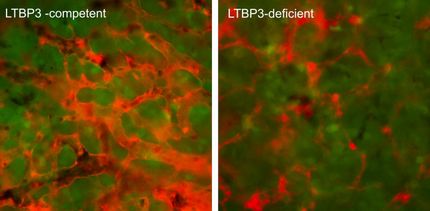ThromboGenics and BioInvent Complete Phase I Patient Trial of Anti-PlGF Cancer Therapeutic TB-403
Advertisement
ThromboGenics NV and BioInvent International AB announced positive results from a Phase I trial of their novel anti-cancer monoclonal antibody TB-403 in patients with advanced solid tumours. The results were presented at the AACR-NCI-EORTC International Conference on Molecular Targets and Cancer Therapeutics in Boston, U.S. TB-403 was well tolerated with no reported dose limiting toxicity. These positive data support progression of TB-403 and further development.
The novel mechanism of action of TB-403 represents a potentially promising cancer therapy. It is a humanized monoclonal antibody directed towards placental growth factor (PIGF), expected to act by blocking the formation of the new blood vessels that are required for tumour growth. Preclinical exploration of PIGF biology suggests a role in tumour angiogenesis and metastasis and a limited role in the maintenance of normal vasculature. This mode of action could result in therapeutic benefit with an acceptable side effect profile.
The multi-centre, dose escalation study was conducted in 23 patients and was designed to both determine the maximum tolerated dose of TB-403 and to evaluate safety and tolerability in patients with advanced solid tumours. TB-403 is licensed by ThromboGenics and BioInvent to Roche under an agreement signed in June 2008.
TB-403 was shown to be well tolerated and no dose limiting toxicity was observed with doses up to 10 mg/kg weekly and 30 mg/kg every three weeks. In this patient population with advanced solid tumours, stable disease was observed in six of 23 patients. In the case of the two patients who were treated with 5 mg/kg TB-403 weekly, their disease was stable for approximately 12 months.
Detailed results of an earlier Phase I trial in healthy volunteers, also presented at the meeting, showed that TB-403 demonstrated a good safety profile with no serious adverse effects reported.
Most read news
Organizations
Other news from the department research and development

Get the life science industry in your inbox
By submitting this form you agree that LUMITOS AG will send you the newsletter(s) selected above by email. Your data will not be passed on to third parties. Your data will be stored and processed in accordance with our data protection regulations. LUMITOS may contact you by email for the purpose of advertising or market and opinion surveys. You can revoke your consent at any time without giving reasons to LUMITOS AG, Ernst-Augustin-Str. 2, 12489 Berlin, Germany or by e-mail at revoke@lumitos.com with effect for the future. In addition, each email contains a link to unsubscribe from the corresponding newsletter.


























































